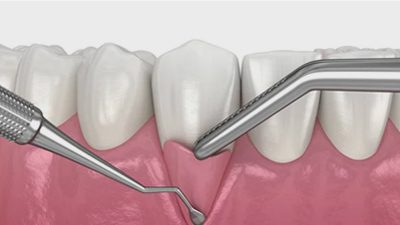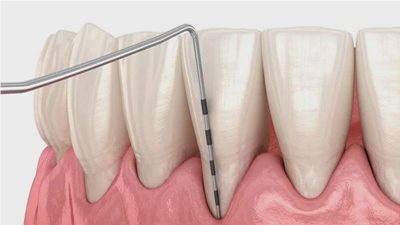Periodontal disease or gum disease is a result of inflammation and infection in the bones and gums that support and surround the teeth. It is a severe oral condition that occurs due to oral bacteria.
The bacteria damage the bone and tissue surrounding your teeth. If you don’t treat it in time, it will break down the teeth. The worst part is that gum disease can cause problems in other parts of your body. This makes timely intervention and treatment essential to avoid further complications.

Leaving periodontal disease untreated can increase your risk of the following issues.

There are several symptoms of gum disease that you can notice at an early stage.
The following signs tell you that it’s time to consult a dentist:

Anyone can suffer from gum disease, but some people are at a higher risk of developing this condition due to their lifestyle. There are certain risk factors that lead to gum diseases:
Non-surgical periodontal treatment is a deep cleaning procedure with scaling and root planning. This procedure is a very thorough cleaning of the root surfaces to eliminate plaque and tartar from those deep surfaces. It smooths out teeth roots to eliminate bacterial toxins and prevent plaque to build up at root surfaces of the teeth.
Scaling and root planning ultimately decrease gingival inflammation. In some instances, few appointments are necessary for a thorough scaling and root planing. Sites that do not respond well to scaling and root planing therapy might require further treatment as time progresses.
Sites that do not respond well to scaling and root planing or minimally invasive periodontal procedures might require further surgical treatment. Periodontists will inspect your teeth to understand the stage and severity of your gum disease. Based on their assessment, they will recommend suitable surgical procedure.
The most commonly chosen surgical treatment procedure are:
Flap Surgery – This treatment helps lift gum tissues back and cover the hollow area for easy flossing and brushing.
Bone Graft – The bone graft helps prevent tooth loss using small fragments of your bone.
Soft Tissue Graft – Your dentist will remove a small part of the tissue from the roof of your mouth and then attach it to the affected gum.
Guided Tissue Regeneration – This treatment helps to regrow the affected bone.
Guided Bone Regeneration (GBR) – This type of procedure help to regrew bone in areas where teeth have been extracted. This procedure will make your bone ready for implant placements.
Guided Tissue Regeneration (GTR) – This treatment helps to regrow the affected bone. This procedure is used to regenerate bone that has been lost around existing teeth or in areas where teeth have been extracted. This procedure will make your bone ready for implant placements.
Dr. Heravi will discuss the specifics about your periodontal surgery and will develop a specific plan for your needs. Usually, recovery from periodontal surgery is smooth and the following habits may help your recovery:
Periodontal disease (gum disease) can have a detrimental effect on oral health, oral function, and overall health. If you are suffering from periodontal disease or would like to check your gum status, consult Dr. Heravi. She has extensive experience and training in the treatment of periodontal disease and she has developed innovative methods published in dental journals to treat gum/periodontal issues.